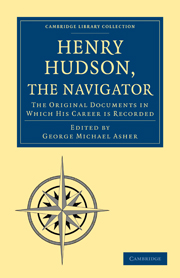Book contents
- Frontmatter
- Contents
- Introduction
- Notes to Introduction
- DIVERS VOYAGES AND NORTHERNE DISCOVERIES
- Divers voyages and northerne discoveries of that worthy discoverer Henry Hudson, from Purchas' Pilgrims, vol. iii, pp. 567-610
- A larger Discourse of the same Voyage and the success thereof, written by Abacuk Pricket
- A note found in the deske of Thomas Wydowse, student of mathematics, one of them who was put into the shallop
- Purchas his Pilgrimage, folio, London, 1626, p. 817. VI. Of Hudson's discoveries and death
- Hudson's first voyage (1607), from Edge's brief discoverie of the Muscovia merchants
- Captain Fotherby's statement concerning Hudson's Journal of his first voyage
- Hudson's third voyage (1609) from Van Meteren's Historie der Nederlanden. Folio, Hague, 1614, fol. 629a
- Extracts relating to Hudson's third voyage (1609), from John de Laet's Nieuwe Werelt, fol., Amsterdam, 1625, 1630-1
- Extracts containing some original information about Hudson's third voyage, from Mr. Lambrechtsen van Ritthem's ‘History of New Netherland’
- Extracts concerning Hudson's third voyage (1609), from Adrian van der Donck's ‘Beschryvinge van Nieuw Nederlandt,’ 4to., Amsterdam, 1655, 1656
- American traditions concerning the third voyage (1609)
- An Extract from Captain Luke Foxe's description of Hudson's fourth voyage (North-West Fox) p. 70
- Hessel Gerritz's various accounts of Hudson's two last voyages, from the Latin and Dutch edition of the ‘Descriptio et Delineatio Geographica detectionis Freti ab H. Hudsono inventi.’ Amst., 1612, 1613: I. Hudson's fourth voyage. A summary printed on the back of the chart. An account of the voyage and new found strait of Mr. Hudson
- APPENDIX
- Index
- Plate section
Purchas his Pilgrimage, folio, London, 1626, p. 817. VI. Of Hudson's discoveries and death
Published online by Cambridge University Press: 05 August 2011
- Frontmatter
- Contents
- Introduction
- Notes to Introduction
- DIVERS VOYAGES AND NORTHERNE DISCOVERIES
- Divers voyages and northerne discoveries of that worthy discoverer Henry Hudson, from Purchas' Pilgrims, vol. iii, pp. 567-610
- A larger Discourse of the same Voyage and the success thereof, written by Abacuk Pricket
- A note found in the deske of Thomas Wydowse, student of mathematics, one of them who was put into the shallop
- Purchas his Pilgrimage, folio, London, 1626, p. 817. VI. Of Hudson's discoveries and death
- Hudson's first voyage (1607), from Edge's brief discoverie of the Muscovia merchants
- Captain Fotherby's statement concerning Hudson's Journal of his first voyage
- Hudson's third voyage (1609) from Van Meteren's Historie der Nederlanden. Folio, Hague, 1614, fol. 629a
- Extracts relating to Hudson's third voyage (1609), from John de Laet's Nieuwe Werelt, fol., Amsterdam, 1625, 1630-1
- Extracts containing some original information about Hudson's third voyage, from Mr. Lambrechtsen van Ritthem's ‘History of New Netherland’
- Extracts concerning Hudson's third voyage (1609), from Adrian van der Donck's ‘Beschryvinge van Nieuw Nederlandt,’ 4to., Amsterdam, 1655, 1656
- American traditions concerning the third voyage (1609)
- An Extract from Captain Luke Foxe's description of Hudson's fourth voyage (North-West Fox) p. 70
- Hessel Gerritz's various accounts of Hudson's two last voyages, from the Latin and Dutch edition of the ‘Descriptio et Delineatio Geographica detectionis Freti ab H. Hudsono inventi.’ Amst., 1612, 1613: I. Hudson's fourth voyage. A summary printed on the back of the chart. An account of the voyage and new found strait of Mr. Hudson
- APPENDIX
- Index
- Plate section
Summary
Henry Hudson, 1607, discovered further north toward the pole, then, perhaps, any before him. He found himselfe in 80 degrees, 23 minutes, where they felt it hot, and dranke water to coole their thirst. They saw land (as they thought) to 82, and further on the shore they had snow, morses teeth, deeres homes, whale-bones, and footing of other beasts, with a streame of fresh water. The next yeere, 1608, he set forth on a discovery to the north-east, at which time they met, as both himselfe and Juet have testified, a mermaid in the sea, seene by Thomas Hils and Robert Rainer. Another voyage he made, 1609, and coasted Newfoundland, and thence along to Cape Cod. His last and fatall voyage was 1610, which I mentioned in my former edition, relating the same as Hesselius Gerardus had guided me, by his card and reports, who affirmeth that he followed the way which Captaine Winwood had before searched by Lumleys Inlet, in 61 degrees, so passing thorow the strait to 50, etc.
- Type
- Chapter
- Information
- Henry Hudson the NavigatorThe Original Documents in which his Career is Recorded, pp. 139 - 144Publisher: Cambridge University PressPrint publication year: 2010First published in: 1860

